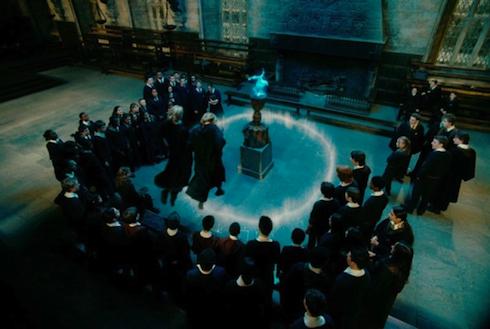Unless it turns out on second viewing that the Half-Blood Prince was from Bel-Air, by far the biggest surprise in this Harry Potter re-watch will be that Goblet of Fire is the worst movie in the series. I had always thought Chamber of Secrets, with its stiff pacing and dogged insistence on putting every sentence of the book on screen (regardless of cinematic value), took the prize, but Goblet of Fire is its clear inferior.
Where the first two movie adaptations were excessively faithful to the books, and the third—to its detractors, anyway—excessively “look at me being a fancy director” on Alfonso Cuarón’s part, Goblet of Fire manages to be the worst of both worlds, an adaptation that deviates from the book for no apparent reason and features unfortunate series newcomer Mike Newell (who is a solid director of non-SFF movies) doing a cut-rate Tim Burton imitation, and making his actors do very odd things.
More than any of the other movies, Goblet of Fire is one where I have a hard time figuring out whether my problems with it are entirely because of the movie’s problems as a movie, or due to my attachment to the book. Certainly the opening scene, where Wormtail addresses the big fella as “my Lord Voldemort,” was not any kind of major cinematic flaw, even if he’d have been Crucio‘d for his insolence in the book. It’s just one hastily delivered line of dialogue. But even setting that aside, there’s a much bigger and enduring problem with this adaptation: Shouty Dumbledore.
Michael Gambon is a fine actor and did well in Prisoner of Azkaban (taking over from the late Richard Harris, who passed away after playing the role in the first two movies) as a kind of ethereal hippie Dumbledore, which is a fair interpretation of the role. Dumbledore certainly has his flaky characteristics. He is, after all, the head adult (for all intents and purposes) of the Wizarding world, itself a flaky place. Despite his eccentricity, though, Dumbledore is two things if he is anything: quiet and in charge. He is this way for seven books and at least three movies (I remember him settling down once David Yates took over as director, and am pretty sure this rewatch will bear that out). In Goblet of Fire he’s shouting at the top of his lungs in every scene, deferring to others’ judgment constantly out of indecisive weakness, and even, most egregiously, violently assaulting Harry Potter.
I’m perfectly willing to accept that my problems with the way Mike Newell directed (or didn’t direct) Michael Gambon are mostly due to the fact that I would have directed the picture differently and aren’t anything objectively wrong. Even being as generous as I could be in a perfect world, Dumbledore could be as weak and equivocal as the day is long, but the scene where he throws Harry up a wall and bellows at him is instant, utter, complete failure. That moment is completely divorced from anything to do with Harry Potter and Albus Dumbledore. It’s a beat from a completely different movie, and one that relies on cheap melodrama as a replacement for dramatic stakes.
There are all kinds of murky dumb things wandering around in the movie of Goblet of Fire. The part where Harry has to outwit the dragon in the first Triwizard task is a perfect metaphor for the entire movie: longer than it needs to be for no apparent purpose, and the dragon coming unmoored and chasing Harry all over kingdom come breaking stuff is a dual signifier not only for the movie’s structural aimlessness, but the utter lack of disregard for its source material. Obviously, I’m not saying the movie needs to parrot the books, but there’s a way to make changes that help the movie. The main things one needs to do in adapting a Harry Potter book for the screen are these:
-
Keep the running time down
-
Keep the pace lively
-
Incorporate all the truly essential elements
-
Either cut or transliterate as much of the the “inessential” elements as you can
Discipline with 3) and 4) will make 1) and 2) fall into place. But they require thought. And this brings us back to the very first scene, where Wormtail addresses his master as “My Lord Voldemort.” This, right at the top, is a sign that insufficient thought went into the adaptation. Screenwriter Steve Kloves might have been getting burned out from five years of basically writing nothing but Harry adaptations, the director might have been nervous about tackling SFF for the first time, or Warner Bros executives might have started tightening the belt because Prisoner of Azkaban grossed under $1 billion. We may never know what caused the thoughtlessness, only that it exists.
Still, as irksome and torturous as much of Goblet of Fire is, there are some bright spots. Alan Rickman is a joy as always; I’ve been watching his performances to see if any of the choices he makes go against the ultimate (and fascinating) revelation of Snape’s true motives and loyalties—because these movies are long enough there’s a bit of time to think about stuff like this while they’re going on—and he hasn’t slipped once in four movies, two of which really suck and would have lent themselves to accidental lapses. But no. Alan Rickman is a Swiss watch of ambiguous malevolence.
Miranda Richardson is fun in a small role as Rita Skeeter, yellow journalist of the Wizarding world, and the scene where she and her self-writing quill “interview” Harry and write whatever the hell they want is well done. In fact, most of the scenes in the movie that have more to do with universal, relatable truths—like the malignance of tabloid journalism, or the amusing sequence where Harry and Ron stagger around like doofballs trying and failing to get dates for the big dance, highlighting the terrifying inscrutability teenage boys project onto women—come off rather nicely. But any scene where someone pulls out a wand or there’s a dragon or some such, forget it.

One of the dirty secrets of Prisoner of Azkaban that I was willing to overlook because I enjoyed the movie was that its special effects weren’t that good. Goblet of Fire has no such advantage, and becomes that most unfortunate of beasts: a big dumb special effects movie where the effects look as dumb as the script sounds. When Voldemort rises from his state of near death to assume his prior role as alpha bad guy, the audience should be scared, not saying, “damn, what’s his head made out of, rubber?” Then again, we’d be willing to accept that as an artistic choice if we hadn’t just had Dumbledore scaring the crap out of us for two hours by shouting and smacking Harry around, and had to watch all the insanely elaborate direction to which Mike Newell subjected poor Emma Watson (the quality of her performance changes radically from movie to movie; she is talented, but she’s raw, and is as such at her director’s mercy).
What’s weird is that I don’t remember this movie being this bad. Then again, if I’d had to write this review based on my memory of it, it’d have been one word long: “meh.” Fortunately, as with so many of these pictures, we still have the books. Speaking of which, what will become of the adaptation of the next book, Harry Potter and the Order of the Phoenix, known for being the longest in the series and for being the introduction (and thankfully, downfall) of “Emo Harry”? Will it be the longest movie in the series, too (spoiler alert: no)? And will “Emo Harry” completely break the medium of cinema? In the next installment of this rewatch, we shall see.
Danny Bowes is a playwright, filmmaker and blogger. He is also a contributor to nytheatre.com and Premiere.com.










